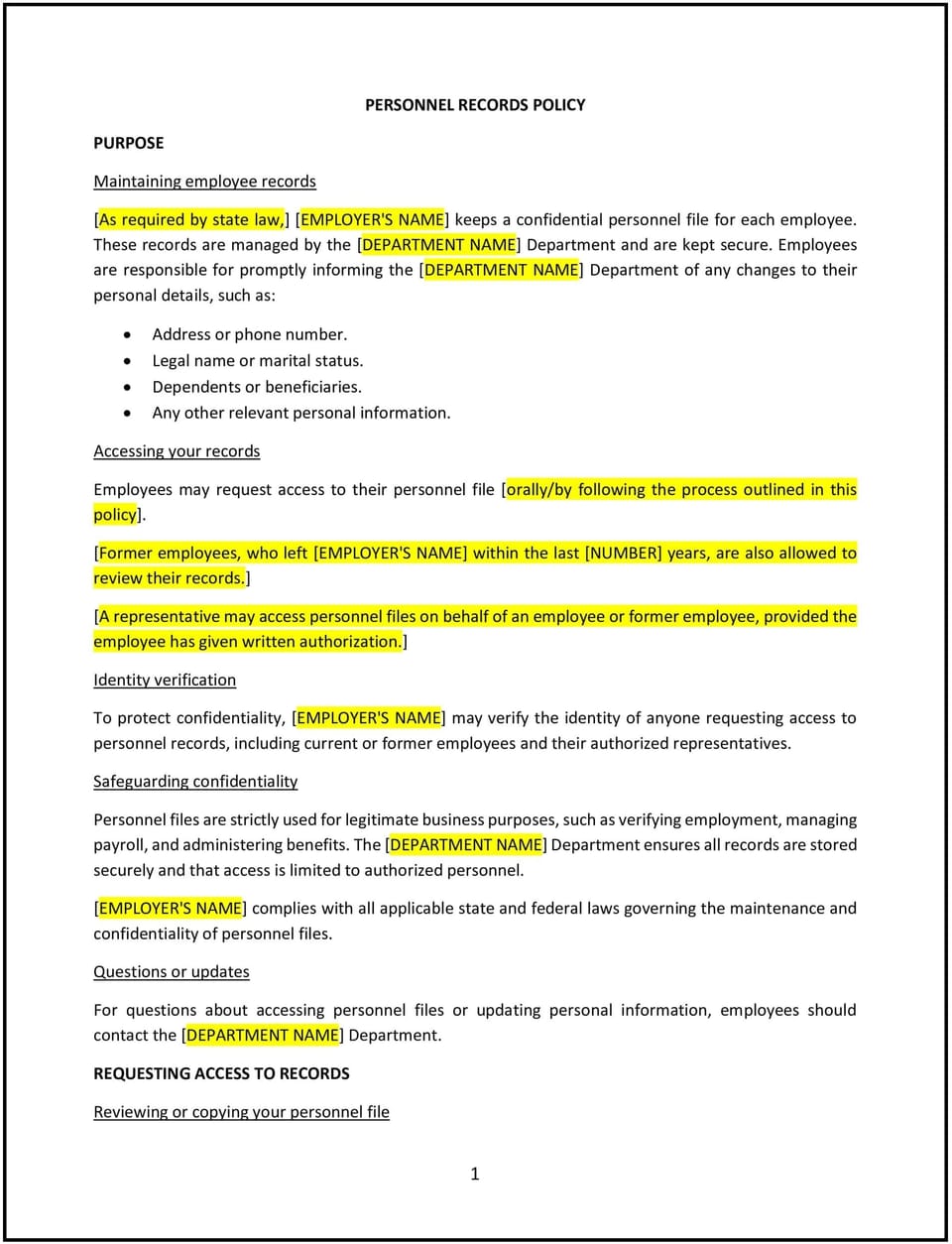Personnel records policy (Alabama): Free template

Personnel records policy (Alabama)
A personnel records policy provides guidelines for the management, storage, and access of employee records. For SMBs in Alabama, this policy supports compliance with applicable state and federal laws, such as the Fair Labor Standards Act (FLSA) and Equal Employment Opportunity (EEO) regulations, while protecting sensitive employee information.
This policy outlines procedures for maintaining accurate records, safeguarding confidentiality, and granting access to authorized individuals, fostering trust and accountability in recordkeeping practices.
How to use this personnel records policy (Alabama)
- Define personnel records: Specify the types of information included, such as employment applications, payroll data, performance evaluations, and disciplinary actions.
- Establish storage protocols: Detail how records are stored securely, such as in locked cabinets or password-protected systems, to prevent unauthorized access.
- Include access guidelines: Specify who is authorized to access personnel records and under what circumstances employees can review their own records.
- Address retention and disposal: Outline how long records are retained and the procedures for secure disposal of outdated documents.
- Ensure compliance: Align the policy with Alabama and federal requirements for personnel records management and employee rights.
Benefits of using a personnel records policy (Alabama)
A personnel records policy supports effective recordkeeping and protects sensitive information. Here’s how it helps:
- Ensures compliance: Meets state and federal laws governing the retention and confidentiality of employee records.
- Protects employee privacy: Safeguards sensitive information from unauthorized access or misuse.
- Promotes accuracy: Encourages consistent and thorough documentation of employment history and actions.
- Streamlines processes: Provides clear guidelines for managing, accessing, and updating records.
- Reduces legal risks: Establishes proper procedures to handle recordkeeping disputes or audits.
Tips for implementing a personnel records policy (Alabama)
- Train HR staff: Provide training on secure storage, access permissions, and retention requirements for personnel records.
- Use digital tools: Invest in reliable software for managing personnel records securely and efficiently.
- Regularly update records: Encourage managers and HR to review and update records periodically to maintain accuracy.
- Limit access: Restrict personnel records access to authorized individuals only, based on job responsibilities.
- Monitor compliance: Conduct audits to ensure adherence to recordkeeping practices and legal standards.
Q: What types of documents are included in personnel records?
A: Personnel records may include job applications, offer letters, payroll information, performance evaluations, disciplinary actions, and training certifications.
Q: Who has access to personnel records?
A: Access is typically limited to HR staff, supervisors with a legitimate need, and the employee, as allowed under the policy and applicable laws.
Q: Can employees review their own personnel records?
A: Yes, employees may request to review their records by submitting a written request to HR, in accordance with Alabama and federal regulations.
Q: How long are personnel records retained?
A: Retention periods vary depending on the type of record, but most documents are kept for three to seven years, as required by law.
Q: How are personnel records protected?
A: Records are stored in secure locations, such as locked cabinets or encrypted digital systems, with access restricted to authorized personnel.
Q: What happens to outdated personnel records?
A: Outdated records are securely destroyed through methods like shredding or permanent digital deletion to protect employee privacy.
This article contains general legal information and does not contain legal advice. Cobrief is not a law firm or a substitute for an attorney or law firm. The law is complex and changes often. For legal advice, please ask a lawyer.


